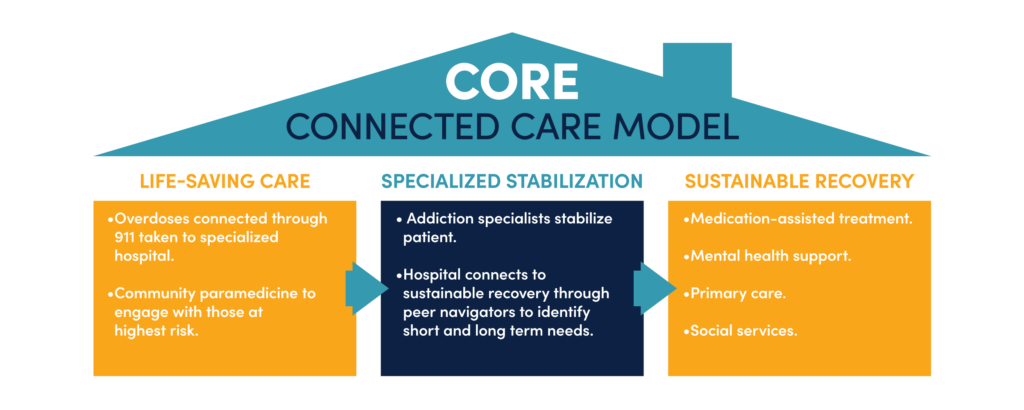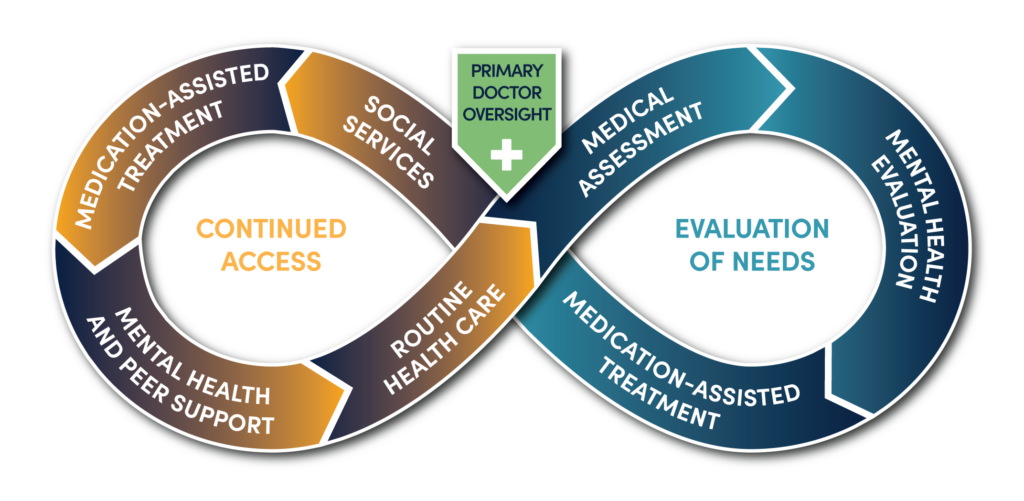This innovative program is the first of its kind in the country, expanding a state-supported cohesive coordinated system of addiction care for individuals suffering from Substance Use Disorder.
If an individual in a CORE county overdoses, 911 protocol calls for stabilization while transporting the patient to a specialty hospital with expertise in addiction medicine, similarly to a trauma center.
Once all emergent health threats are stabilized, the patient’s long term care needs will then be transferred to an expert multi-specialty outpatient practice to support sustainable recovery.
CORE Network’s Connected Care Model addresses overdose and Substance Use Disorder (SUD) as a disease.
There are three pillars to the CORE network that supports a connected care treatment model and sustainable patient recovery:

CORE connects these essential pillars under one strong foundation for long-term sustainable recovery.
SUD occurs when the recurrent use of alcohol and/or drugs causes clinically significant impairment, including health problems, disability, and failure to meet major responsibilities at work, school, or home.
Medications can be used to manage withdrawal symptoms, prevent relapse, and treat co-occurring conditions.
Withdrawal: Medications help suppress withdrawal symptoms during detoxification. Detoxification is not in itself “treatment,” but only the first step in the process. Individuals who do not receive any further treatment after detoxification usually resume their drug use.
Relapse prevention: Individuals can use medications to help re-establish normal brain function and decrease cravings. Medications are available for treatment of opioid (heroin, prescription pain relievers), tobacco (nicotine), and alcohol addiction. Scientists are developing other medications to treat stimulant (cocaine, methamphetamine) and cannabis (marijuana) addiction.
CORE Network’s Connected Care Model supports all the necessary ingredients for sustainable recovery. Sustained access to MAT is a critical component that can be necessary for some individuals to assist in their long-term recovery.
The CORE Network’s Connected Care Model doesn’t only treat the substance use disorder through one pillar like MAT, but through a support system of care that addresses MAT access, secondary impacts of SUD, and treats addiction as a disease, not a finite condition.
By encompassing these pillars into one overarching model of treatment, individual recovery is not siloed into separate categories – they are working symbiotically.
The goal of CORE is to support those with a structural foundation to recover from Substance Use Disorder.
The CORE Network’s Connected Care Model creates a support system that is overseen by an addiction medicine expert and continuously engaged in providing access to essential services to support long-term SUD recovery, in addition to any underlying causes.
The CORE Network encourages communities to assess their existing Substance Use Disorder structures and support linkages to care that parallel the Connected Care Model.
